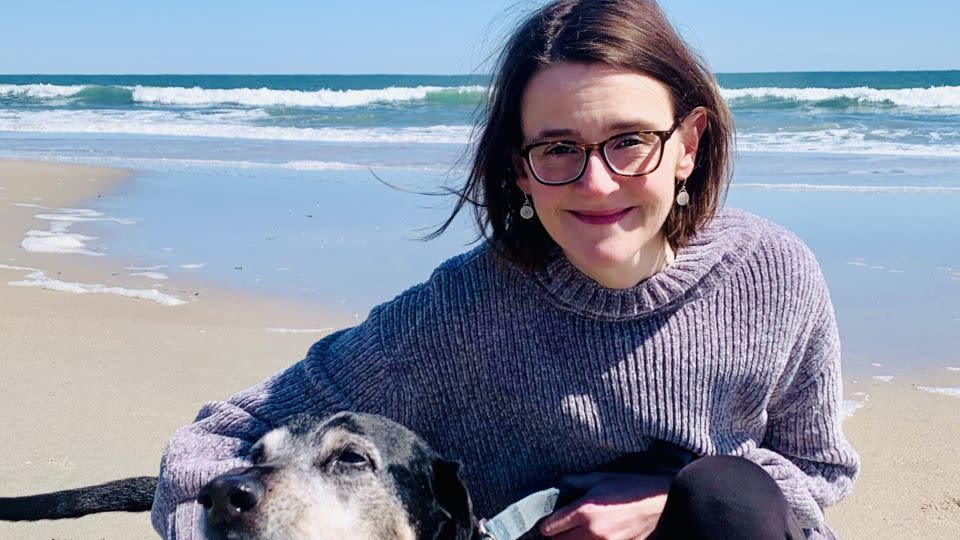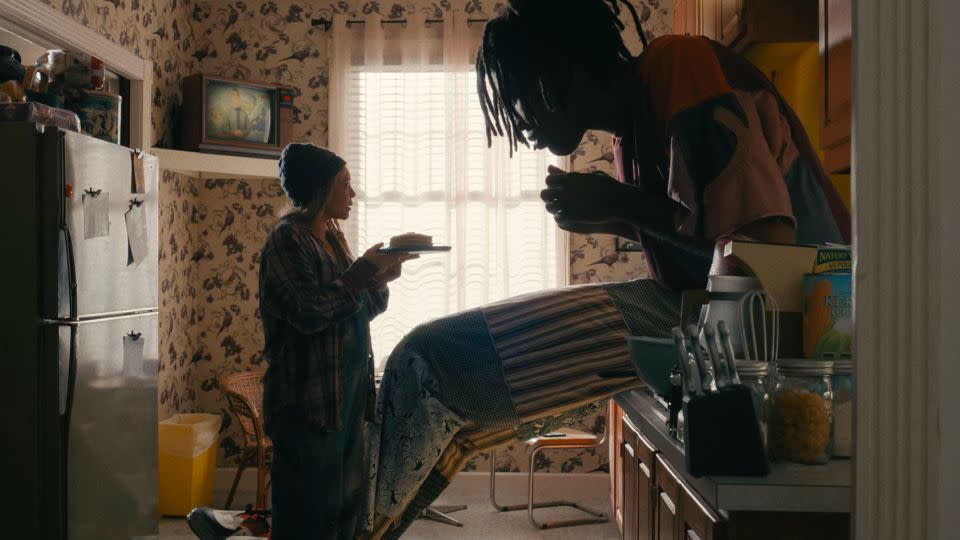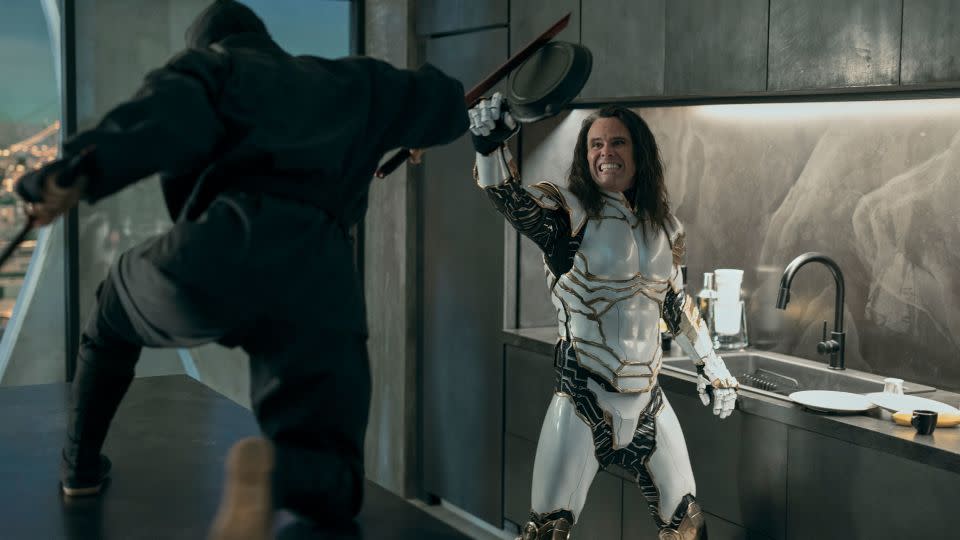Opinion: The kind of superhero we need right now
- Oops!Something went wrong.Please try again later.
- Oops!Something went wrong.Please try again later.
Editor’s Note: Sara Stewart is a film and culture writer who lives in western Pennsylvania. The views expressed here are solely the author’s own. View more opinion articles on CNN.
Mild spoilers follow for “I’m a Virgo.”
Like a plot twist out of the multiverse, a huge comic-book movie is currently tanking at the box office while an anti-superhero, anti-capitalist streaming series garners raves. It’s enough to make Captain America see red.

Amazon Prime’s “I’m a Virgo,” an Oakland, California-set satire about a 13-foot-tall Black teenager named Cootie (Jharrel Jerome), is the brainchild of director/musician/activist Boots Riley. In its premiere weekend, the series was reported to be the most popular one on the platform.
I feel confident saying “I’m a Virgo” is also the most unique new show you’re going to find on Prime, or anywhere else, right now. There are so many big ideas splashing around in this series it’s nearly impossible to delineate them all; looming large are the visceral harms of capitalism, racism and the police state, plus the role of mainstream pop culture in enforcing complicity in all three.
But this show isn’t a polemical slog; its seven episodes are goofy, warm and funny, with hat-tips to classics ranging from “Gulliver’s Travels” to “Do the Right Thing,” and some out-there animation. There aren’t a lot of directors these days taking such a big, wide creative swing. And, as Jerome told The Oregonian, the colorful packaging is what makes Riley’s message so much more palatable for audiences.
“When we think of capitalism, the second someone says that in a conversation, I’m out of here. I’m like, ‘Nah, I don’t want to talk about that.’ But it is an incredibly important topic, and Boots knows how to make it fun. And this show is a fun exploration of that entire system.”
“Virgo” also features Walton Goggins as Cootie’s idol-turned-nemesis, a billionaire comic-book creator and crime-fighting vigilante who goes by The Hero and flies around the city in a jet-propelled suit not dissimilar to that of Tony “Iron Man” Stark. In what feels like a straightforward jab at Marvel, Riley even has The Hero ensconced in a futuristic skyscraper called the MCI Building. (That’s just one letter off from the MCU, or Marvel Cinematic Universe.)

When we first meet Cootie, he’s starry-eyed about The Hero, having devoured a steady diet of the comic books in his 19 years of growing up in hiding with his protective aunt and uncle (Carmen Ejogo and Mike Epps), who worry about the reception a Black giant will get in the outside world.
Gradually, as Cootie starts sneaking out and makes a group of friends that includes outspoken community organizer Jones (Kara Young), he comes to see The Hero as enforcing a status quo built on the suffering of Oakland’s working class.
While Cootie’s superpower is his size, and his love interest, a fast-food chef named Flora (Olivia Washington), is gifted with super-speed, Jones’ superpower is, rather hilariously, her ability to explain complex political concepts in a compelling way. In the final episode, she delivers a mystical monologue that breaks it down for The Hero: “You’re a tool that helps capitalism run smoothly,” she tells him, rather than the savior he so badly wants to be.
Riley has talked to NPR about this scene, describing the critique he’s making: “It’s about the idea of crime itself, right? And I don’t want to give too much about — away about the end, but what superhero shows and what cop shows do is not only promote this idea of the police being the good guys. It’s also to sell us this idea that poverty and crime come from bad choices of the impoverished.”
Subtle? No. But Riley’s presentation of the concept is so much livelier than the vague murmurs of “superhero fatigue” that have been percolating for a while. We’re in a moment in which unemployment is rising (especially for Black women), climate change is increasingly visible, civil rights are being rolled back and billionaires are enjoying record profits. Maybe it’s not surprising people would be hungry to hear, and discuss, more about the inherent cynicism of a genre that celebrates the triumph of so-called law and order, largely enforced by privileged White guys.

And maybe there’s more to our fatigue than, as one Variety critic recently put it, “when a comic-book movie looks and feels like every other damn comic-book movie.” Perhaps there is an increasing amount of dissonance in Hollywood’s deifying fictional characters who purport to defend American justice, when a lot of us are questioning in whose name that justice is really being done.
Which brings us to “The Flash,” the long-gestating DC Comics movie in which Barry Allen (Ezra Miller), aka The Flash, gets all tangled up in the multiverse (DC Studios and CNN share a parent company, Warner Bros. Discovery). Despite early hype, the film got lukewarm reviews for taking few creative risks and is, by most accounts, a pretty glaring failure.
It was striking to witness the lengths to which DC went to avoid firing its embattled star while preemptively cancelling the biracial, female-led “Batgirl.” (Miller sought mental health treatment after a series of legal problems, pleading guilty to unlawful trespassing in January 2023. Of “Batgirl,” DC Studios co-chair Peter Safran told the press that the film “was not releasable” and said that the cancelation was a “very bold and courageous decision.”)
By contrast, the multiverse-comics movie that’s got people’s attention is “Spider-Man: Across the Spider-Verse,” the second installment in a trilogy where the wall-crawling hero is not Peter Parker but Miles Morales, a Black/Latino teenager, who’s rendered in cutting-edge animation. Spidey is crushing it at the box office, a suggestion that maybe there is, indeed, a way forward for superheroes who break the traditional mold. Viewers, it seems clear, want something new.
Cut to Riley, who’s well-versed in rousing an audience with candy-coated calls to revolt. His band The Coup, which dates back to the early 1990s, is overtly political, putting out funk-infused tracks with titles like “5 Million Ways to Kill a CEO.”
In 2018, he grabbed critics’ attention with his debut film “Sorry to Bother You,” a surreal black comedy about a telemarketer’s journey into the heart of a sinister corporation, and the workers’ strike that ensues. These days, the SF Gate reports, “the Coup’s songs, like ‘The Guillotine’ and ‘Genocide & Juice,’ are used to boost morale during protests. Screenings of ‘Sorry to Bother You’ are now held by workers voting to form a union or go on strike.”
As it happens, “Virgo” couldn’t have been much more perfectly timed for Riley’s brand: The creator skipped out on much of the usual pre-release publicity for the show because he was participating in the Writer’s Guild strike.
If it seems wildly hypocritical that a professed communist is partnering with one of the world’s biggest, most union-busting corporations to sell his product, Riley says it’s the price of reaching your audience.
“The only reason people have ever heard of my art is because that’s what we’ve been doing,” he told Variety. “There’s no clean way to get stuff done.” And in a way, Riley pulling off the stunt of getting Jeff Bezos’ company to pay him for a show openly advocating for workers to revolt - well, that might just be a feat worthy of a new kind of superhero.
For more CNN news and newsletters create an account at CNN.com

